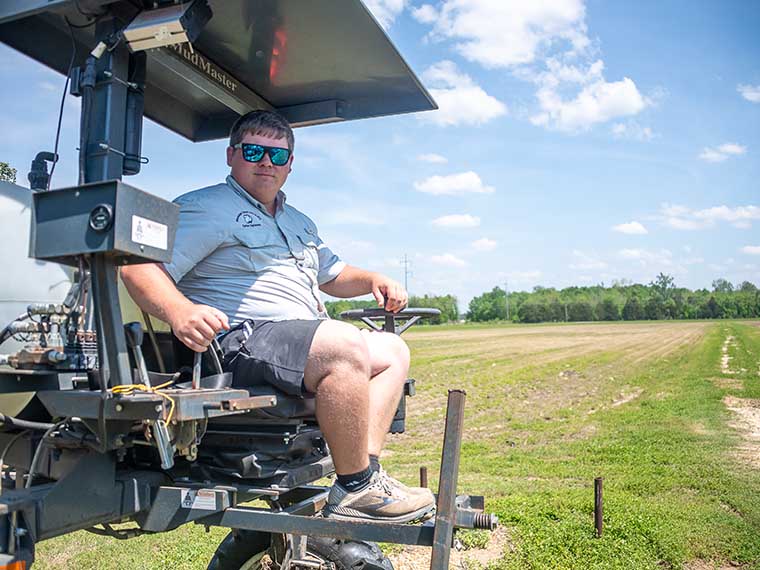The information presented on this page may be dated. It may refer to situations which have changed or people who are no longer affiliated with the university. It is archived as part of Mississippi State University's history.
On the outskirts of Hattiesburg, Bryce Bullock's roots in peanut farming run as deep as the fertile soil beneath his feet. Bullock's childhood was steeped in the rhythms of farming life, nurturing a profound connection to the land that would shape his future endeavors. For him, peanuts weren't just a crop; they were a way of life. Witnessing his father, a dedicated crop consultant, tend to the peanut fields with care, Bullock's fascination with peanuts took root at a young age.
Today, as an agronomy master's student, Bullock immerses himself in the complexities of disease management and varietal selection. With a sharp attention to detail and an unrelenting passion for discovery, Bullock adeptly tackles the challenges encountered by peanut farmers, addressing issues ranging from late leaf spot to southern blight, each presenting its own distinct hurdles to overcome.
"The most important thing a farmer needs to know is what grows well in their area," Bullock said. "My research is dedicated to evaluating disease resistance among several peanut varieties, with a particular emphasis on the Mid-South region. Through experimentation and data analysis, my research will benefit farmers in the field."
In his research, Bullock designs and executes experiments aimed at explaining the intricate dynamics of disease resistance and varietal performance in peanuts. The experiment is conducted at the MAFES R.R. Foil Plant Science Research Center in Starkville, and the Delta Research and Extension Center in Stoneville. The experiment evaluates disease resistance of six different peanut cultivars: GA-06G, GA-1GR, TIFNV-HG, FloRun 52N, FloRun T61, and UF 11x23.
To assess disease incidence, Bullock conducts regular visual inspections of the plants, documenting any signs of late leaf spot and southern blight at multiple stages of growth. Utilizing standardized rating scales, such as the Florida Leaf Spot 1-10 scale, he quantifies the severity of disease symptoms, capturing the nuanced progression of fungal infections over time.
In addition to disease assessment, Bullock diligently monitors the impact of pathogen pressure on peanut yield, recording factors such as pod development, nut size, and overall plant vigor. By conducting thorough yield assessments at harvest time, he gains valuable insights into the resilience of each peanut variety in the face of disease challenges.
Employing advanced statistical techniques, Bullock rigorously analyzes the extensive dataset generated from his experiments. Leveraging the capabilities of SAS 9.4 software, he scrutinizes the collected data to discern meaningful patterns and correlations, allowing him to draw robust conclusions regarding the relative disease resistance and agronomic performance of the tested peanut varieties.
With another year of data collection ahead, he aims to provide valuable insights that can inform varietal selection strategies and enhance the resilience of peanut farming in the Mid-South region.
After graduating, Bullock plans to return home to Hattiesburg, Mississippi, and continue his family's crop consulting business, honoring their legacy and deepening his connection to the land. Alternatively, he also considers venturing into the agricultural industry, where he can apply his research findings and insights to drive innovation and advance the field of peanut farming on a broader scale.
"Whether I continue my family's legacy in crop consulting or venture into the wider agricultural industry, my goal remains the same: to contribute to the sustainability and success of peanut farming while honoring the rich heritage of our region," Bullock said.
This research is partially funded by the Mississippi Peanut Promotion Board. Bullock is co-advised in his master's degree program by Drs. Brian Pieralisi and Brendan Zurweller, both assistant professors in plant and soil sciences.

